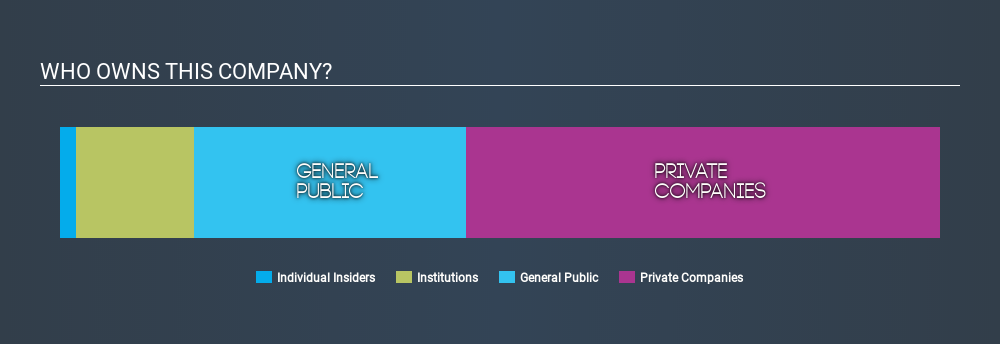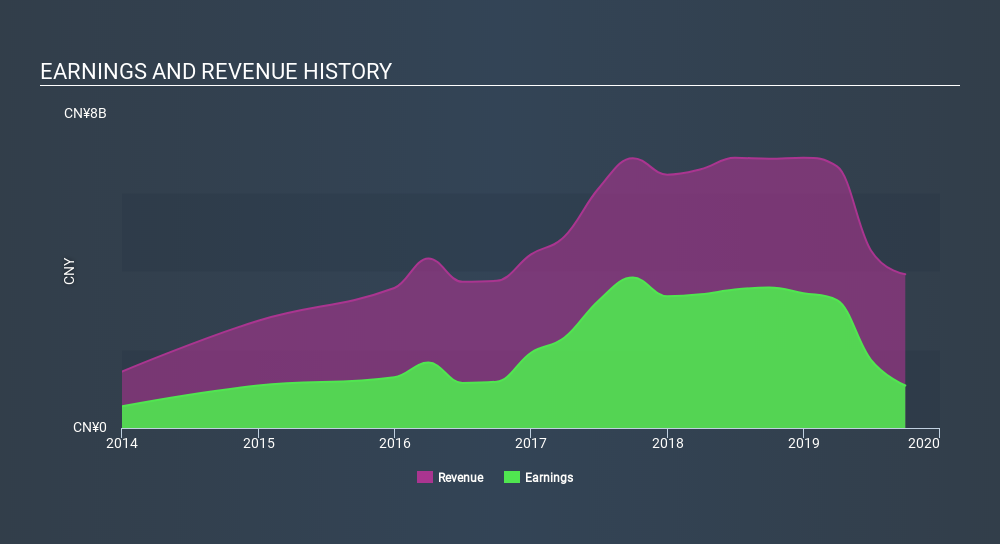What Kind Of Shareholders Own Bank of Gansu Co., Ltd. (HKG:2139)?

A look at the shareholders of Bank of Gansu Co., Ltd. (HKG:2139) can tell us which group is most powerful. Large companies usually have institutions as shareholders, and we usually see insiders owning shares in smaller companies. Companies that used to be publicly owned tend to have lower insider ownership.
Bank of Gansu has a market capitalization of HK$13b, so we would expect some institutional investors to have noticed the stock. Taking a look at our data on the ownership groups (below), it's seems that institutions own shares in the company. We can zoom in on the different ownership groups, to learn more about Bank of Gansu.
See our latest analysis for Bank of Gansu

What Does The Institutional Ownership Tell Us About Bank of Gansu?
Many institutions measure their performance against an index that approximates the local market. So they usually pay more attention to companies that are included in major indices.
We can see that Bank of Gansu does have institutional investors; and they hold 13% of the stock. This suggests some credibility amongst professional investors. But we can't rely on that fact alone, since institutions make bad investments sometimes, just like everyone does. It is not uncommon to see a big share price drop if two large institutional investors try to sell out of a stock at the same time. So it is worth checking the past earnings trajectory of Bank of Gansu, (below). Of course, keep in mind that there are other factors to consider, too.

Hedge funds don't have many shares in Bank of Gansu. Gansu Provincial Highway Aviation Tourism Investment Group Co.Ltd. is currently the company's largest shareholder with 12% of shares outstanding. Baoshang Bank Co Ltd, Asset Management Arm is the second largest shareholder with 8.4% of common stock, followed by Jiuquan Iron & Steel (Group) Co., Ltd., holding 6.3% of the stock.
On further inspection, we found that 50% of the share register is owned by the top 8 shareholders, suggesting that the interests of the larger shareholders are balanced out to an extent by the smaller ones.
While studying institutional ownership for a company can add value to your research, it is also a good practice to research analyst recommendations to get a deeper understand of a stock's expected performance. As far I can tell there isn't analyst coverage of the company, so it is probably flying under the radar.
Insider Ownership Of Bank of Gansu
The definition of an insider can differ slightly between different countries, but members of the board of directors always count. The company management answer to the board; and the latter should represent the interests of shareholders. Notably, sometimes top-level managers are on the board, themselves.
Most consider insider ownership a positive because it can indicate the board is well aligned with other shareholders. However, on some occasions too much power is concentrated within this group.
Shareholders would probably be interested to learn that insiders own shares in Bank of Gansu Co., Ltd.. This is a big company, so it is good to see this level of alignment. Insiders own HK$252m worth of shares (at current prices). If you would like to explore the question of insider alignment, you can click here to see if insiders have been buying or selling.
General Public Ownership
The general public, with a 31% stake in the company, will not easily be ignored. While this group can't necessarily call the shots, it can certainly have a real influence on how the company is run.
Private Company Ownership
We can see that Private Companies own 54%, of the shares on issue. It's hard to draw any conclusions from this fact alone, so its worth looking into who owns those private companies. Sometimes insiders or other related parties have an interest in shares in a public company through a separate private company.
Next Steps:
While it is well worth considering the different groups that own a company, there are other factors that are even more important. For instance, we've identified 3 warning signs for Bank of Gansu that you should be aware of.
If you would prefer check out another company -- one with potentially superior financials -- then do not miss this free list of interesting companies, backed by strong financial data.
NB: Figures in this article are calculated using data from the last twelve months, which refer to the 12-month period ending on the last date of the month the financial statement is dated. This may not be consistent with full year annual report figures.
If you spot an error that warrants correction, please contact the editor at editorial-team@simplywallst.com. This article by Simply Wall St is general in nature. It does not constitute a recommendation to buy or sell any stock, and does not take account of your objectives, or your financial situation. Simply Wall St has no position in the stocks mentioned.
We aim to bring you long-term focused research analysis driven by fundamental data. Note that our analysis may not factor in the latest price-sensitive company announcements or qualitative material. Thank you for reading.
About SEHK:2139
Bank of Gansu
Together with its subsidiary, provides banking and related financial services in the People’s Republic of China.
Flawless balance sheet with questionable track record.
Similar Companies
Market Insights
Community Narratives



